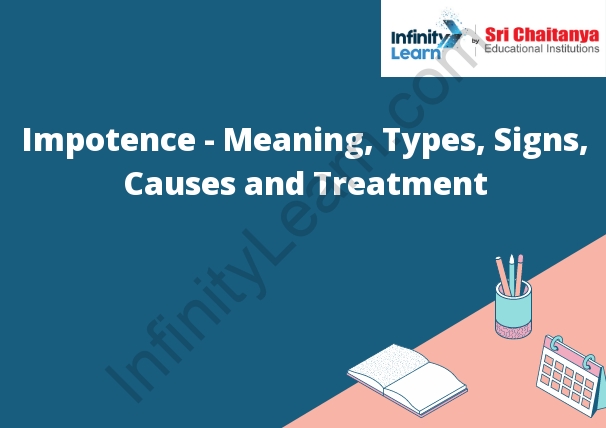Table of Contents
What Does Impotence Mean?
Impotence is the inability to achieve or sustain an erection for satisfactory sexual activity. It is also known as erectile dysfunction.

Types of Impotence
There are three types of impotence: physical, psychological, and mixed.
- Physical impotence is caused by a physical problem, such as a disease, injury, or surgery.
- Psychological impotence is caused by mental factors, such as stress, anxiety, or depression.
- Mixed impotence is caused by both physical and psychological factors.
Signs of Impotence
There are many signs of impotence. It is a condition where a man is unable to have an erection. This can be a sign that there is a problem with the man’s health. There are many possible causes of impotence, including physical problems, psychological problems, and lifestyle choices.
Some of the most common signs of impotence include difficulty getting or maintaining an erection, a decrease in sexual desire, and difficulty climaxing. If a man is experiencing any of these signs, it is important to see a doctor. Impotence can be a sign of a more serious health problem, and it is important to get it treated.
Sign of Male Impotence
Male impotence is a condition in which a man is unable to achieve or maintain an erection sufficient for sexual intercourse. Impotence is a common problem, affecting up to half of all men at some point in their lives. It can be caused by physical or emotional factors, or a combination of both. Physical factors include diseases, injuries, or surgeries that affect the nerves or blood vessels involved in erections. Emotional factors include stress, anxiety, depression, and relationship problems.
Sign of Female Impotence
Female impotence, also known as female sexual dysfunction (FSD), is a condition in which a woman experiences difficulty performing or enjoying sexual activities. This condition is relatively common, affecting anywhere from 10 to 40 percent of women.
FSD can manifest in a variety of ways, including a lack of desire for sex, difficulty becoming aroused, problems with orgasm, and pain during sex. There is no one cause of FSD, but it can be the result of a variety of factors, including physical and emotional health issues, medication side effects, lifestyle choices, and relationship problems. Treatment for FSD depends on the underlying cause, and may include lifestyle changes, medication, therapy, or surgery.
Causes of Impotence
There are many potential causes of impotence, including physical injuries, nerve damage, chronic health conditions, medications, and psychological issues.
Physical injuries can cause impotence if they damage the nerves or blood vessels involved in erections. Nerve damage can be caused by physical injuries, as well as by conditions like diabetes or multiple sclerosis. Chronic health conditions like heart disease, high blood pressure, and obesity can also lead to impotence.
Medications can cause impotence by interfering with the blood flow or nerve signals necessary for erections. Many common medications, including anti-depressants, anti-histamines, and blood pressure medications, can cause impotence. Psychological issues can also cause impotence, including stress, anxiety, and depression.
Risk Factors of Impotence
There are a number of risk factors associated with impotence, including:
- Age – the older you are, the more likely you are to experience impotence
- Medical conditions – such as diabetes, heart disease, and high blood pressure
- Medications – such as blood pressure medications, antihistamines, and antidepressants
- Lifestyle choices – such as smoking, alcohol consumption, and obesity
- Psychological factors – such as stress, anxiety, and depression
Possible Methods to Reduce Risk Factor of Impotence
There are a few methods that may help reduce the risk factor of impotence. Some of these methods include:
- Quitting smoking – Smoking can damage the blood vessels and nerves in the penis, which can lead to impotence.
- Exercising regularly – Exercise can help improve the overall health of the body, including the penis. This can help reduce the risk of impotence.
- Eating a healthy diet – A healthy diet can help improve overall health, including the health of the penis. This can help reduce the risk of impotence.
- Maintaining a healthy weight – Being overweight can put strain on the body, including the penis. This can lead to impotence.
- Avoiding excessive alcohol consumption – Excessive alcohol consumption can damage the blood vessels and nerves in the penis, leading to impotence.
Impotence Treatment
There are a number of treatments for impotence. The most common treatments are medications, such as sildenafil (Viagra), tadalafil (Cialis), and vardenafil (Levitra), that are used to treat erectile dysfunction.
Other treatments for impotence include penile injections, penile implants, and vacuum devices.
Male Impotence Treatment
There are a number of different treatments for male impotence. One common treatment is the use of a medication called sildenafil (Viagra). This medication helps to improve blood flow to the penis, which can help to improve erectile function. Other treatments for male impotence may include the use of penile injections, penile implants, or vacuum devices.
Female Impotence Treatment
There are many different ways to treat female impotence. One of the most common treatments is hormone therapy. This therapy uses hormones to help increase blood flow to the genitals and to improve sexual function. Other treatments include surgery, counseling, and lifestyle changes.








